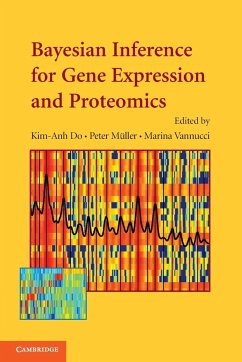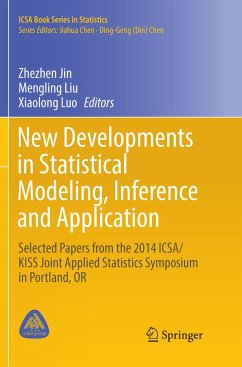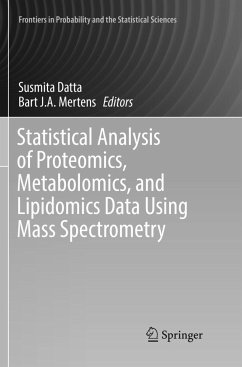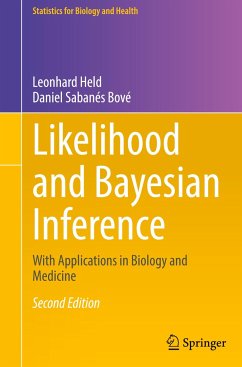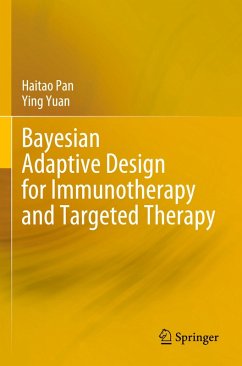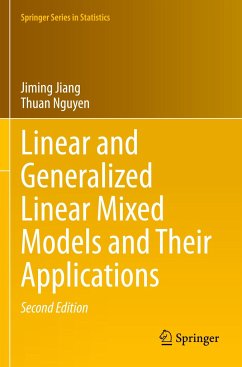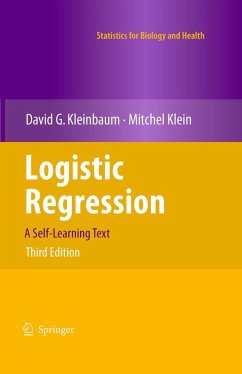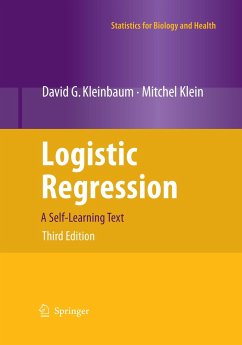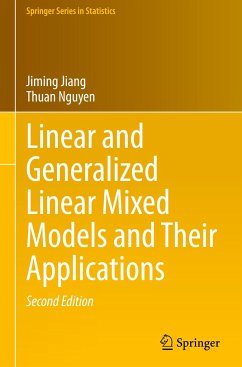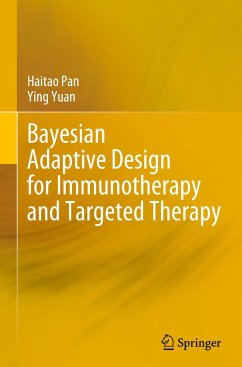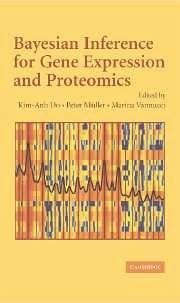
Marina Vannucci
Gebundenes Buch
Bayesian Inference for Gene Expression and Proteomics
Versandkostenfrei!
Versandfertig in über 4 Wochen

PAYBACK Punkte
35 °P sammeln!




Expert overviews of Bayesian methodology, tools, and software for multi-platform high-throughput experimentation.
Professor Do has significant publications contributing towards her fields of interest including efficient bootstrap methods and empirical likelihood, classification and functional methods with smoothing, Bayesian methods for the genetic analysis of twin and family data, and general biostatistical methods applicable to medical research. One of her current collaborative research focuses with colleagues at M.D. Anderson Cancer Center is towards the development of statistical methods to analyze data produced from high-throughput technologies, such as cDNA microarrays and serial analysis of gene expression (SAGE), to phage peptide libraries and proteomic profiles generated by mass spectrometry, with the goal of revolutionizing the diagnosis, classification, and ultimately the treatment of diseases, including cancer. Specifically, Professor Do has developed a program (GENECLUST) written in Splus/R and C with a JAVA interface that can be implemented on a variety of platforms (Linux, Solaris, DEC, Windows). GENECLUST is basically an efficient implementation of the gene-shaving procedure described by Hastie et al (2000). Another program (BAYESMIX), also written in Splus/R and C, implements a Bayesian mixture model for differential gene expression.
Professor Mueller's research interests and contributions are in the areas of Markov chain Monte Carlo posterior simluation, nonparametric Bayesian inference, hierarchical models, mixture models, and Bayesian decision problems. In recent research, he has developed related models and inference approaches for applications to bioinformatics problems. In particular, the use of Dirichlet process mixture models for inference in microarray group comparison experiments, decision theoretic solutions to sample size choice in high throughput gene and protein expression experiments, and the use of hierarchical mixture of Beta models for inference in mass/charge spectra.
Professor Vannucci's research has focused on the theory and practice of Bayesian variable selection techniques and on the development of wavelt-based statistical models and their applications. Her work has been often motivated by real problems that needed to be addressed with suitable statistical methods. DNA microarray data are characterized by many variables (gene expressions) and relatively few samples. These studies often aim either at predicting different types of tissues or diseases or at the discovery of unknown subtypes (particularly in cancer studies). In addition, it is important that the identified molecular classes are defined on a msall number of genes that can serve as biomarkers for improved diagnosis and therapeutic intervention. Professor Vannucci's work has focused on the development of Bayesian methods that offer a coherent framework in which variable selection and classification or clustering of the samples are performed simultaneously. Her word has been applied to the identification of molecular signatures predictive of different stages of rheumatoids arthritis (RA), to microarray data on endometroid endometrial cancer, and to ovarian cancer prediction based on proteomic data. A recent trend in the bioinformatics field has focused on the integration of data of different forms. Professor Vannucci has worked on models that combine DNA microarray data with genome sequences. The method uses Bayesian variable selection techniques to identify DNA-binding sites for regulatory factors and has been applied to S. cerevisiae and S. pombe genomes using microarray data from environmental stress experiments.
Professor Mueller's research interests and contributions are in the areas of Markov chain Monte Carlo posterior simluation, nonparametric Bayesian inference, hierarchical models, mixture models, and Bayesian decision problems. In recent research, he has developed related models and inference approaches for applications to bioinformatics problems. In particular, the use of Dirichlet process mixture models for inference in microarray group comparison experiments, decision theoretic solutions to sample size choice in high throughput gene and protein expression experiments, and the use of hierarchical mixture of Beta models for inference in mass/charge spectra.
Professor Vannucci's research has focused on the theory and practice of Bayesian variable selection techniques and on the development of wavelt-based statistical models and their applications. Her work has been often motivated by real problems that needed to be addressed with suitable statistical methods. DNA microarray data are characterized by many variables (gene expressions) and relatively few samples. These studies often aim either at predicting different types of tissues or diseases or at the discovery of unknown subtypes (particularly in cancer studies). In addition, it is important that the identified molecular classes are defined on a msall number of genes that can serve as biomarkers for improved diagnosis and therapeutic intervention. Professor Vannucci's work has focused on the development of Bayesian methods that offer a coherent framework in which variable selection and classification or clustering of the samples are performed simultaneously. Her word has been applied to the identification of molecular signatures predictive of different stages of rheumatoids arthritis (RA), to microarray data on endometroid endometrial cancer, and to ovarian cancer prediction based on proteomic data. A recent trend in the bioinformatics field has focused on the integration of data of different forms. Professor Vannucci has worked on models that combine DNA microarray data with genome sequences. The method uses Bayesian variable selection techniques to identify DNA-binding sites for regulatory factors and has been applied to S. cerevisiae and S. pombe genomes using microarray data from environmental stress experiments.
Produktdetails
- Verlag: Cambridge University Press
- Seitenzahl: 456
- Erscheinungstermin: 24. Juli 2006
- Englisch
- Abmessung: 235mm x 161mm x 29mm
- Gewicht: 739g
- ISBN-13: 9780521860925
- ISBN-10: 052186092X
- Artikelnr.: 21974401
Herstellerkennzeichnung
Libri GmbH
Europaallee 1
36244 Bad Hersfeld
gpsr@libri.de
Für dieses Produkt wurde noch keine Bewertung abgegeben. Wir würden uns sehr freuen, wenn du die erste Bewertung schreibst!
Eine Bewertung schreiben
Eine Bewertung schreiben
Andere Kunden interessierten sich für


